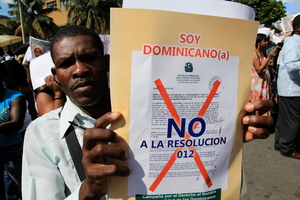
The Working Group of Experts of People of African Descent request comes after the May adoption of a law to establish a special system for people born in the Dominican Republic and registered irregularly in the Dominican civil and naturalization registry.
“This is an important step toward rectifying the situation by which tens of thousands of persons of Haitian descent born in the Dominican Republic were rendered stateless by a ruling of the constitutional court on Sept. 23, 2013,” said Mireille Fanon Mendes-France, who heads the Working Group.
“However, it is crucial to restore citizenship of those born in the Dominican Republic who were not registered at birth and who represent a large majority,” Mendes-France emphasized. “It is essential to have an effective and transparent process to ensure that the citizenship of these people is restored at the earliest.”
The human rights expert stressed that such a step would effectively reinforce the fight against discrimination and social exclusion faced mostly by people of African descent in the country.
Last October, the U.N. human rights office urged the Dominican Republic to take measures to ensure that citizens of Haitian origin, including children born in the Dominican Republic, were not deprived of their right to nationality in light of the September court ruling.
Until 2010, the country had followed the principle of automatically bestowing citizenship to anyone born on its soil. But in 2010, a new constitution stated that citizenship would be granted only to those born on Dominican soil to at least one parent of Dominican blood or whose foreign parents are legal residents.
Source: un.org

